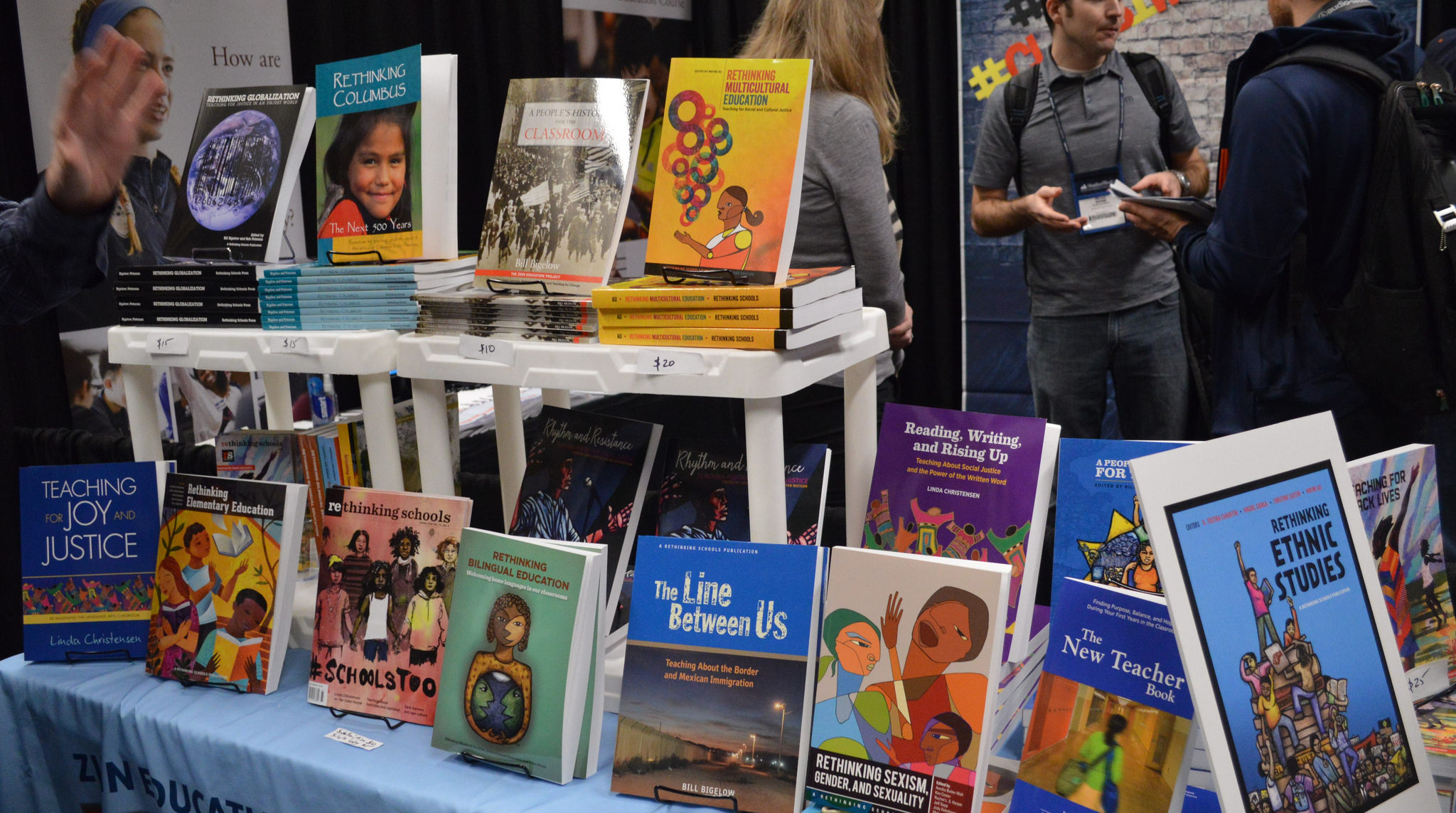
I attended the COINTELPRO session Saturday morning. The speaker was absolutely amazing. I now have many resources not only for my future classrooms but also for my future capstone project. I appreciated the structure, resources, and anecdotes that she provided.
— Katlyn Buika, pre-service high school teacher, LaCrosse, Wisconsin
Katlyn Buika captures the excitement of teachers who attended Zinn Education Project people’s history workshops at the National Council for the Social Studies conference. Our team brought people’s history workshops and a booth full of teaching resources to the annual NCSS conference in Chicago on November 30 and December 1, 2018.
In the first hour of the conference, our 9:35am session Why Do People Go to Prison? Analyzing American Incarceration — led by Camila Arze Torres Goitia and Kim Kanof — drew about 70 teachers from across the country.
Ursula Wolfe-Rocca’s Saturday morning workshop on COINTELPRO was also overflowing ― with 60 people squeezing into a room for 40 and more turned away.
Ours were among the few sessions at the conference addressing contemporary issues from a social justice perspective. Other sessions offered by our team over the two days included:
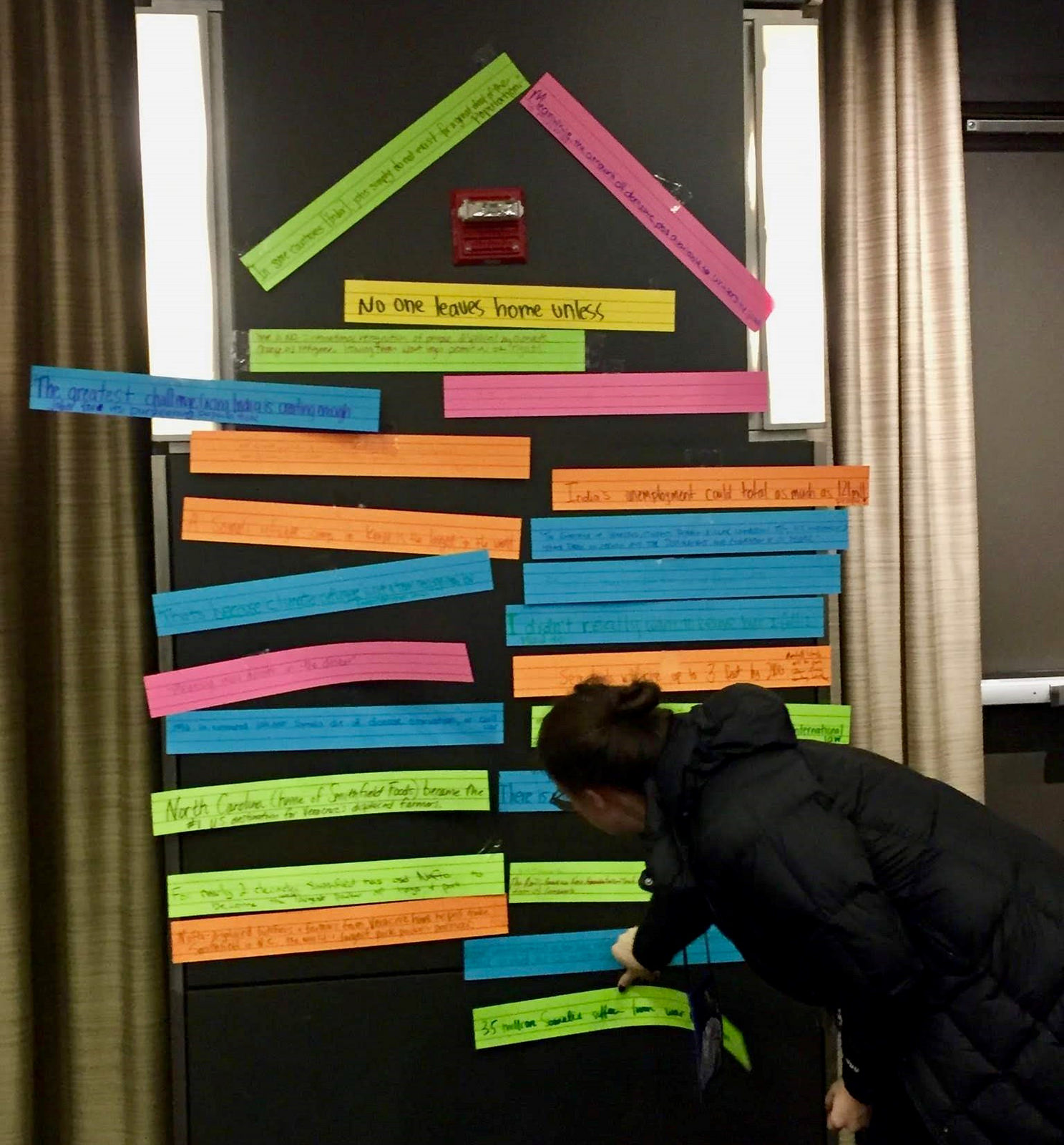
“Challenging Immigration Myths” workshop activity.
“What is Islamophobia? A Jigsaw Activity” by Alison Kysia. Educators explored issues of anti-Black and anti-immigrant racism through the lens of Islamophobia.
“The Future of School: Black Voices on Desegregation” by Ursula Wolfe-Rocca and Natalie Labossiere. This role play surfaced the complexity of desegregation for Black students and educators following Brown v. Board of Education.
“Challenging Immigration Myths in a Social Studies Classroom” by Camila Arze Torres Goitia and Kim Kanof. Through cases studies modeled on many of Arze’s and Kanof’s students, educators learned about a broad array of refugees and the social and environmental crises creating them.
“Let Them Eat Profits: Hunger, Capitalism, and Peasant Agriculture” by Tim Swinehart and Chris Buehler. Participants engaged in a role play about the largest social movement in the world, La Vía Campesina.
For the first time this year, we offered “mini sessions” at our booth. Some were on topics that had been rejected by the conference organizers, such as Reconstruction. [See the full list of our workshops and mini-sessions at the end of this page.]
Louisiana high school teacher Chris Dier led a discussion about the Reconstruction era 1868 St. Bernard Parish Massacre. Rethinking Schools editor and high school teacher Moé Yonamine introduced educators to the “other internment,” of Latin American Japanese during World War II. Portland, Oregon, high school teacher Chris Buehler offered a session on the buried story of the Rojava revolution in Northern Syria.
The Zinn Education Project booth was a hot spot for exchanging ideas, sharing books, and gathering stories. Several conference-goers described the booth as an oasis in a largely corporate and conservative space.
In addition to the mini-sessions, we collected teaching stories in exchange for book prizes, sold Rethinking Schools books and subscriptions, and displayed other people’s history titles. Two of the most popular titles were Teaching for Black Lives and A People’s Curriculum of the Earth.
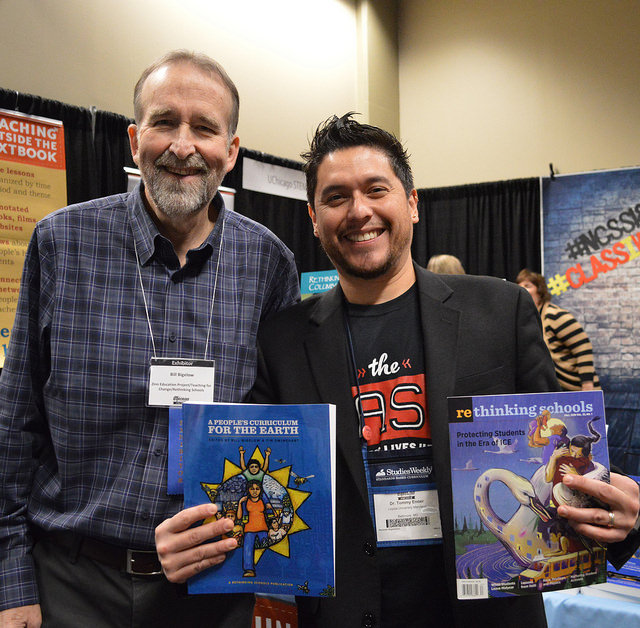 Bill Bigelow and Tommy Ender |
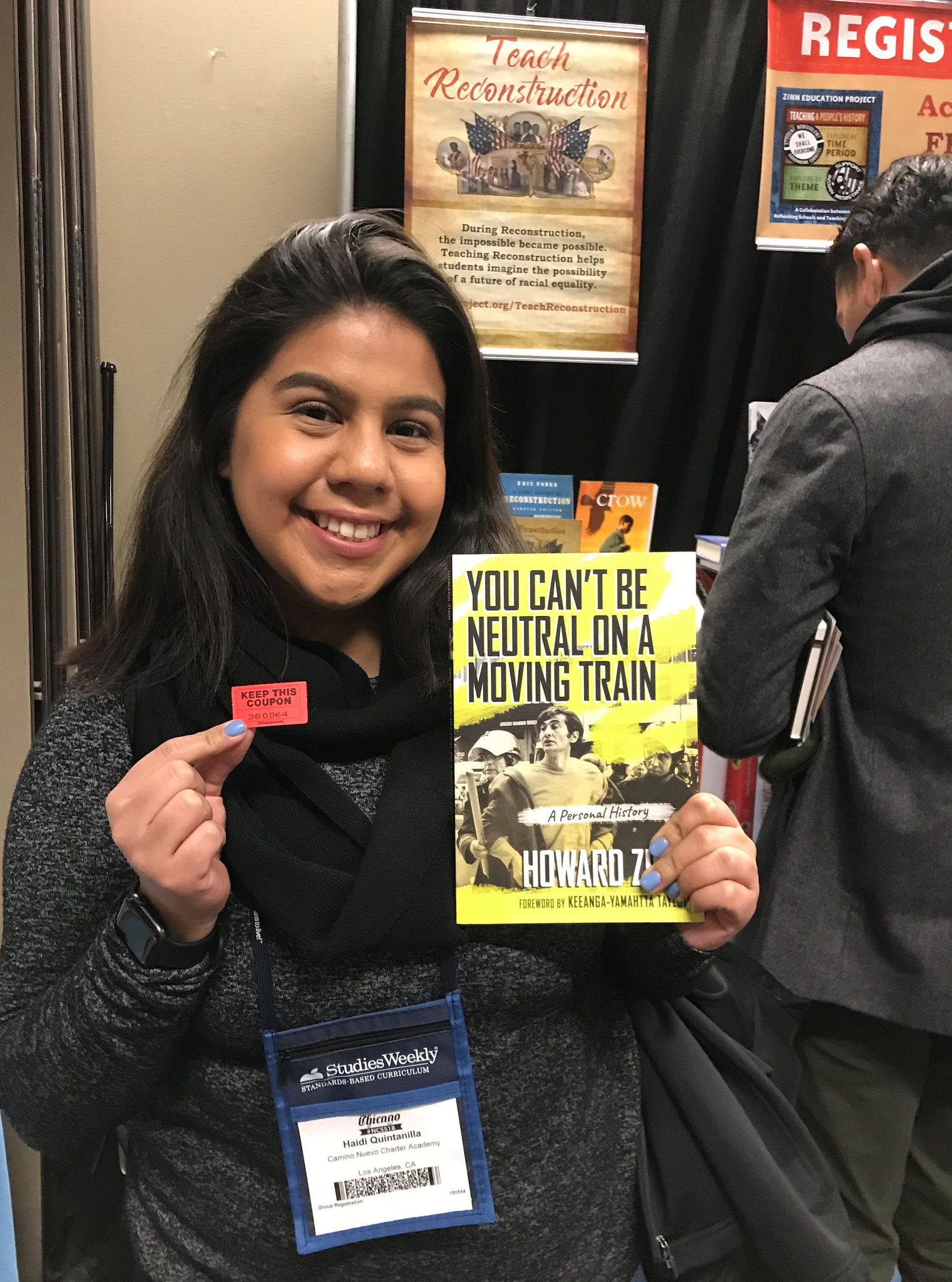 Haidi Quintanilla |
In our raffle, we gave away more than 150 books donated by publishers by The New Press, Beacon Press, Pantheon, and Harper Collins. Attendees went home with copies of Blood in the Water, American Hate, An Indigenous People’s History of the United States, We Crossed a Bridge and It Trembled: Voices from Syria, An African American and Latinx History of the United States, the new edition of Howard Zinn’s autobiography, You Can’t Be Neutral on a Moving Train, A People’s History of the United States, and more titles.
Here are two of the many stories teachers shared about the impact of the Zinn Education Project:
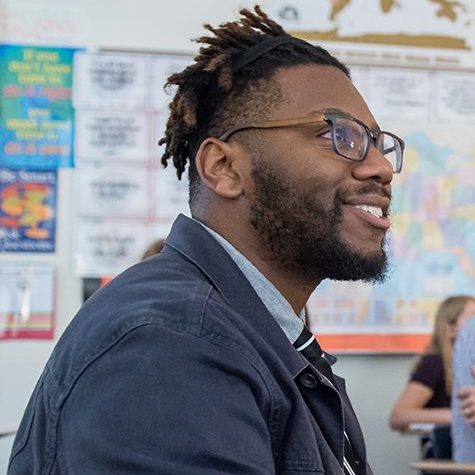
I’ve used the Zinn Education Project’s materials since my first year teaching.
Nine years later, my students can speak to the power of deconstructing the narratives of Christopher Columbus and Abraham Lincoln’s efforts that have replicated white supremacy and marginalization of people of color in historical discourse.
For many of them, it is empowering to learn from multiple perspectives and invigorates their desire to learn and disrupt the status quo.
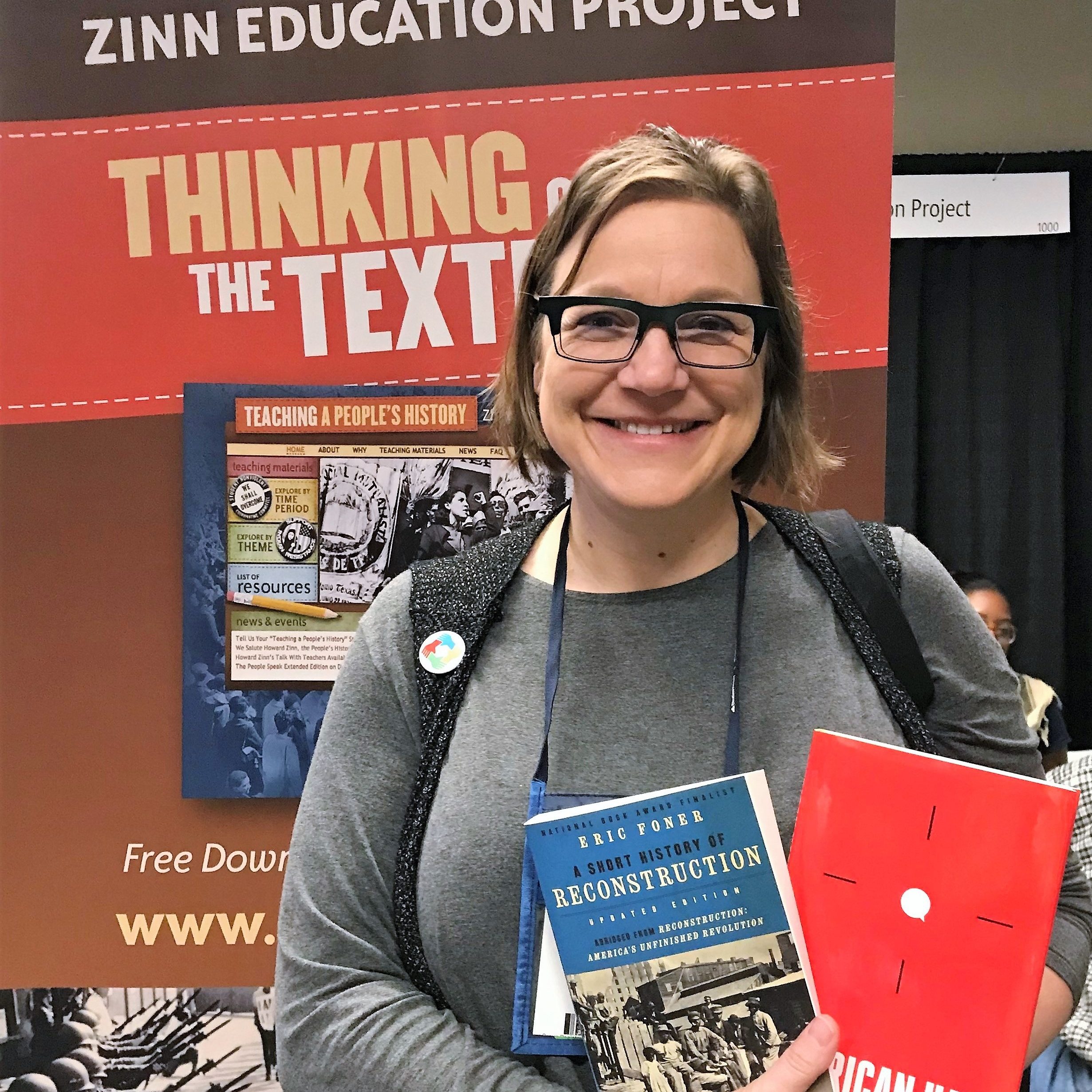
The Zinn Education Project has delivered time and time again the most impactful experiences for my students. They will not remember the PowerPoint info on the Articles of Confederation, but they will remember when they wrote the Constitution from the perspective of an enslaved African American or a member of the Iroquois nation using the Constitutional Convention role play.
They understand the problems embedded into the way our country was founded AND the remarkable opportunities we have to reshape the conversation in our nation.
On Saturday evening, we held a gathering where we presented longtime teacher activist Michael Charney with the Teaching People’s History Award for his role in inspiring, guiding, and supporting the Teach Reconstruction campaign.
Below are more photos from the people’s history workshops and booth.
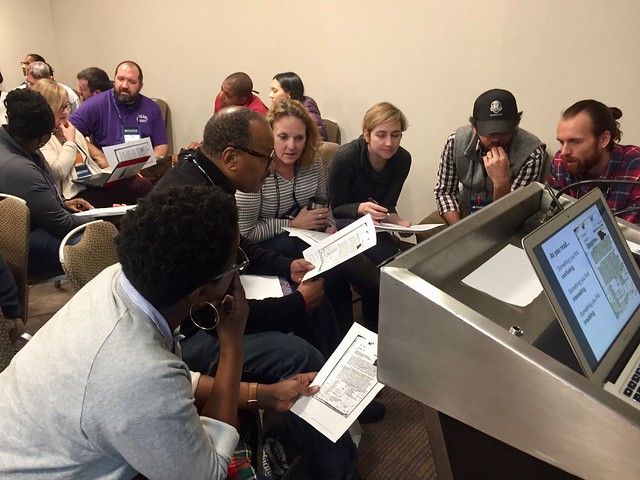
People’s History Workshops
Here are the workshops offered by the Zinn Education Project team members at the NCSS conference.
Friday, Nov. 30
- 9:35-10:05 am • Why Do People Go to Prison?: Analyzing American Incarceration by Camila Arze Torres Goitia and Kim Kanof • Power Session #2350 • Room: Water Tower, Concourse Level, West Tower
- 2:45-3:45 pm • What is Islamophobia? A Gallery Walk by Alison Kysia • Session #1961 • Room: Comiskey, Concourse Level, West Tower
Saturday, Dec. 1
- 10:15-11:15 am • COINTELPRO: Teaching the FBI’s War on the Black Freedom Movement by Ursula Wolfe-Rocca • Session #1509 • Room: Burnham, 3rd Floor, West Tower
- 12:05-12:35 pm • The Future of School: Black Voices on Desegregation by Ursula Wolfe-Rocca and Natalie Labossiere • Power Session #1833 • Room: Water Tower, Concourse Level, West Tower
- 2:45-3:45 pm • Challenging Immigration Myths in a Social Studies Classroom by Camila Arze Torres Goitia and Kim Kanof • Session #2420 • Room: Plaza B, Lobby Level, East Tower
- 4:00-5:00 pm • Let Them Eat Profits: Hunger, Capitalism, and Peasant Agriculture by Tim Swinehart and Chris Buehler • Session #2452 • Room: Crystal A, Lobby Level, West Tower
People’s History Chats at Booth #118/#1000
People’s history lesson chats at our booth led by teacher leaders, authors, and organizers.
Friday, Nov. 30 (10:00 am – 6:00 pm)
- 12:30-12:50pm • The Other Internment: Teaching the Hidden Story of Japanese Latin Americans during WWII • People’s History Lesson Chat with Moé Yonamine
- 1:00-1:20pm • Teaching the Syrian Civil War: Finding Hope from the Revolution in Rojava • People’s History Lesson Chat with Chris Buehler
- 1:30-1:50pm • Who Killed Reconstruction? A Trial • People’s History Lesson Chat with Adam Sanchez
- 2:00-2:20pm • The 1868 St. Bernard Parish Massacre: Blood in the Cane Fields • People’s History Lesson Chat with Chris Dier
Saturday, Dec. 1 (8:00 am – 4:00 pm)
- 12:30-12:50pm • Teaching SNCC: The Organization at the Heart of the Civil Rights Revolution • People’s History Lesson Chat with Adam Sanchez
- 1:00-1:20pm • American Hate: Lessons from Survivors • People’s History Lesson Chat with Alison Kysia
- 1:30-1:50pm • Make Reconstruction History Visible Campaign • People’s History Lesson Chat with Deborah Menkart, Nqobile Mthethwa, et. al.
- 2-2:20pm • Introduction to Central America • People’s History Lesson Chat with Faye Colon
People’s History Raffle

People’s History Raffle with more than 100 copies of A People’s History of the United States by Howard Zinn, We Crossed a Bridge and It Trembled: Voices from Syria by Wendy Pearlman, American Hate: Survivors Speak Out by Arjun Singh Sethi, You Can’t Be Neutral on a Moving Train by Howard Zinn, Indigenous Peoples’ History of the U.S. by Roxanne Dunbar-Ortiz, and An African American and Latinx History of the US by Paul Ortiz, and more people’s history titles. Lots of chances to win.






Twitter
Google plus
LinkedIn